Apr 2, 2024 12:59 PM
Saxophonist, Sonic Explorer Casey Benjamin Dies at 45
Casey Benjamin, the alto saxophonist, vocalist, keyboardist and producer who stamped his distinctive sounds on the…
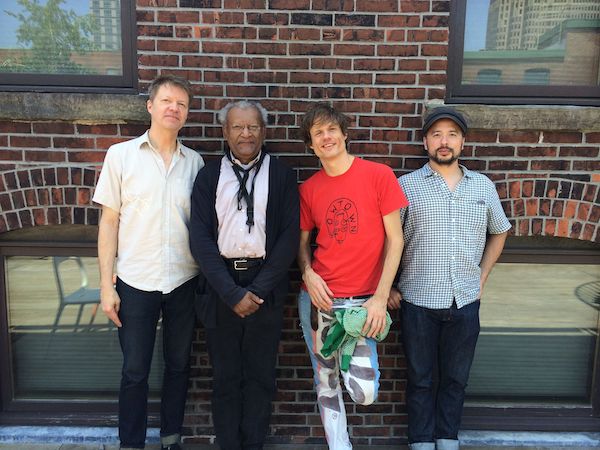
Guitarist Nels Cline (left), composer/reedist Anthony Braxton, drummer Greg Saunier and multi-instrumentalist Taylor Ho Bynum recorded Quartet (New Haven) 2014 five years ago. The work only now is being released on Firehouse 12, an imprint based in New Haven, Connecticut.
(Photo: Courtesy of the Artist)Speaking with Anthony Braxton is much like trying to improvise alongside the 74-year-old reedist: You need to stay on your toes and keep your ears open, ready to react and respond to whatever he might drop in your path.
Which is why a recent conversation with the composer began with a discussion of Quartet (New Haven) 2014, the recently issued collection of raucous and jagged material recorded with guitarist Nels Cline, drummer Greg Saunier (of avant-rock quartet Deerhoof) and brass player Taylor Ho Bynum, and quickly wandered well beyond that starting point. During a nearly hour-long chat, Braxton touched on his spiritual beliefs, his approach to composition and how it often takes years for a forward-thinking artist like himself to get their due.
Not that Braxton has been waiting around for the accolades.
Since his formative years in the late ’60s, studying and working with the AACM in Chicago, he’s issued hundreds of recordings and compositions, many constructed from his interest in mathematics or using graphic scores. And his work has gone far beyond jazz into the realms of opera and contemporary classical music, while weaving in rock, gospel and country. As powerful as the work on Quartet (New Haven) 2014 is—four nearly hour-long pieces of muscular, almost psychedelic explorations that make ample use of Cline’s grinding electric racket and the unnatural sounds that Braxton can summon from his instruments—it’s really a drop in the bucket of his endlessly sprawling discography.
This new collection also arrives at a time when the spotlight on Braxton is particularly strong. The Tri-Centric Foundation, the arts organization that oversees the archiving and continued dissemination of his work, has curated three years worth of concerts and events to celebrate the artist’s 75th birthday. It’s a series that will continue through 2020, including two dates in Oakland, California: a Nov. 16 concert at Mills College and a Feb. 1, 2020, performance at the Temescal Arts Center.
Gratifying as it is, Braxton is not wasting time basking in the glow of attention. As he told DownBeat recently, now that he’s stepped down from his role as a professor at Wesleyan College, he finally can spend the bulk of his time composing and performing, continuing to grow his already sizable legacy.
The following has been edited for length and clarity.
This latest release arrives five years after you and the band recorded these sessions. This has become something of a common practice for you and your label; to release the material a number of years after it was recorded. What’s the thinking behind that? Is it simply a matter of finances? Or wanting to make sure that what is being released is up to your standards?
First, I would say this: When I think of releasing music, I’m thinking more in terms of documenting my music in the same way that any researcher would document their work and go from that to the next project. Of course, money is always a factor, especially when you are poor and don’t have a lot of money. Sometimes, recordings are not able to come out for decades.
You’ve said that part of the reason you wanted to play with Cline and Saunier was inspired by seeing them perform together. What was it about their work that captured your attention?
I must say it was the first time I had ever heard Nels and Greg play. I knew Nels and his brother, [drummer Alex Cline], since they were young men. The whole family’s incredible. But for that performance, it was the communication, the creativity. The understanding of forward thrust and opposition. The use of dynamics. The ability to get the maximum out of a moment. The ability to recognize the moment when something should happen or should stop or something should change.
I’m really describing some of the subcomponents that help the improviser in making decisions in the moment. I put it that way as opposed to saying, “Oh, you improvise whatever you want to improvise and it’s freedom, freedom, freedom from the ’60s.” In fact, I rejected the freedom from the ’60s and have spent my life working on evolving a musical system that would give flexibility, and yet at the same time have a “ring pass-not” as opposed to “anything can happen.”
Just because the cosmic forces might not be right in front of your face does not mean that the cosmic forces are not there. The idea of freedom as some kind of existential something that brings about utopian possibilities ... I’m not interested in utopia in the first place. And second of all, it’s going back to those meta-reality fundamentals that make some improvisations more interesting to experience than others. So, with Nels, Greg and Taylor, one can experience—on the CD, even—multiple levels of communication taking place. Opposite polarities emerging. Extended solos. Support solos. Language music geometrics. And, plus, we brought in a composition that wasn’t quite finished and everyone picked what they wanted from it. It turned out even better than I would have hoped for, because a good improviser is a really good composer.
You’ve talked a lot over the years about these cosmic forces. Is that something you feel that anyone, in the arts and beyond, can tap into or is that something you’re connected to from birth?
When I was growing up, I attended the Baptist church. Later, I went to the Catholic church. Later, the Methodist church. The Church of Scientology. Zen Buddhism. At some point, it became clear to me that the forces that attracted my interest were coming through the sonics of manifestation and that music was the vehicle I was looking for.
Music has a spiritual component for me. Music has an emotional component for me. And when I think about this time period in America, among the things I worry about is the subject of spiritualism. I’m not part of any organized religious group at this point in my life, but it’s possible to feel the difference, vibrationally, in the culture as people back up more and more from any idea of spirituality. The children are not being taught about anything spiritual in grammar school or high school. Then you get to college, suddenly any spiritual perception is viewed in a complex way.
In many ways, I understand the complex reaction that has opened up with the arrival of complete equality for all of our citizens, which has to be the baseline for any culture. And yet at the same time, the church is now viewed as a hate group. When I was coming up, John Coltrane talked about The Creator and the need to look inside yourself, and the fact that there are things like ethics and value systems. There are codes of behavior, which have worked pretty well for the last 2,500 years. It seems to me, in this period, we are making changes in a way that’s maybe a little too quick. You have migrants come to America. This has made our country great. But when it’s done in a way where you’re bringing people in in a short time space, there’s no time for a community to come together, to have vibrational unity.
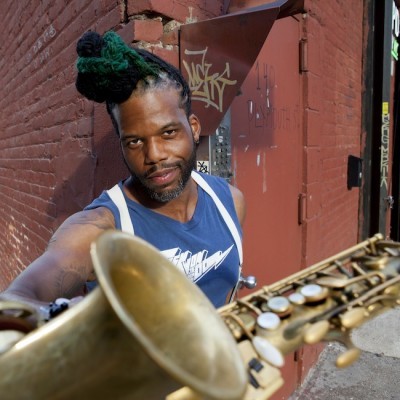
Benjamin possessed a fluid, round sound on the alto saxophone, and he was often most recognizable by the layers of electronic effects that he put onto the instrument.
Apr 2, 2024 12:59 PM
Casey Benjamin, the alto saxophonist, vocalist, keyboardist and producer who stamped his distinctive sounds on the…
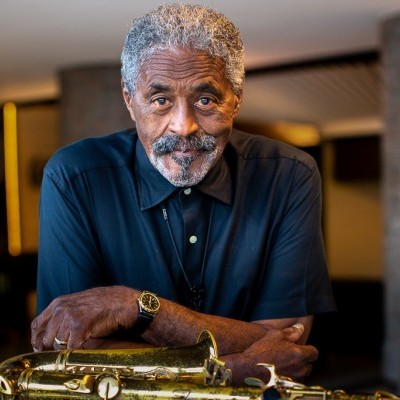
“He’s constructing intelligent musical sentences that connect seamlessly, which is the most important part of linear playing,” Charles McPherson said of alto saxophonist Sonny Red.
Feb 27, 2024 1:40 PM
“I might not have felt this way 30 to 40 years ago, but I’ve reached a point where I can hear value in what people…
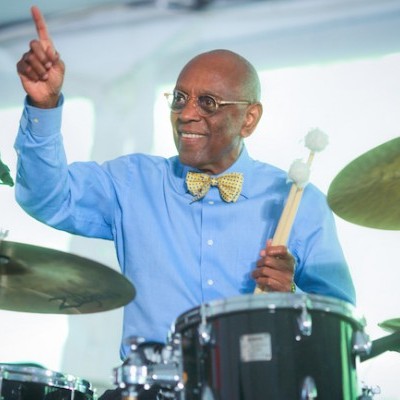
Albert “Tootie” Heath (1935–2024) followed in the tradition of drummer Kenny Clarke, his idol.
Apr 5, 2024 10:28 AM
Albert “Tootie” Heath, a drummer of impeccable taste and time who was the youngest of three jazz-legend brothers…
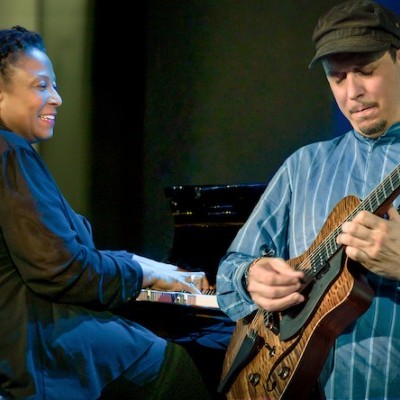
“Both of us are quite grounded in the craft, the tradition and the harmonic sense,” Rosenwinkel said of his experience playing with Allen. “Yet I felt we shared something mystical as well.”
Mar 12, 2024 11:42 AM
“There are a few musicians you hear where, as somebody once said, the molecules in the room change. Geri was one of…
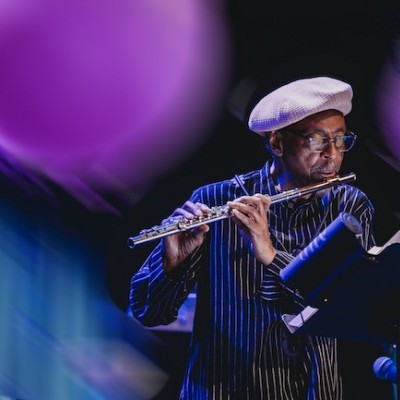
Henry Threadgill performs with Zooid at Big Ears in Knoxville, Tennessee.
Apr 9, 2024 11:30 AM
Big Ears, the annual four-day music celebration that first took place in 2009 in Knoxville, Tennessee, could well be…